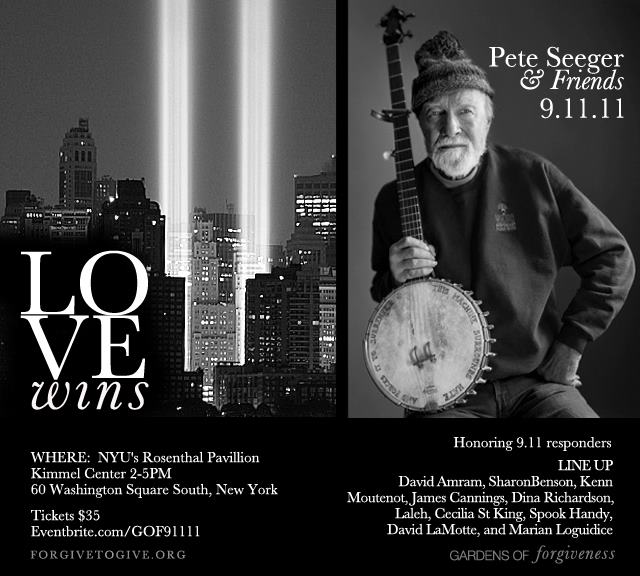 It’s late Monday night and I’m staying up by the wood stove trying to catch up on some work. Or at least I was. My plans for the night just changed. A few minutes ago I received a note from my friend Laura saying that Pete Seeger left us about an hour ago. Apparently the news isn’t really public yet, and I’m glad to have a little time to sit with it. What an extraordinary life.
It’s late Monday night and I’m staying up by the wood stove trying to catch up on some work. Or at least I was. My plans for the night just changed. A few minutes ago I received a note from my friend Laura saying that Pete Seeger left us about an hour ago. Apparently the news isn’t really public yet, and I’m glad to have a little time to sit with it. What an extraordinary life.
Pete touched my life deeply, as he did so many others, across space and generations. I had one chance to meet him and to perform with him, and spent a bit of time in conversation with him that day as well. I don’t want to claim a closer relationship than I had — that was the only time our paths crossed in person. That one day taught me a great deal, though.
It was September 11, 2011, the tenth anniversary of the attacks. Pete Seeger, David Amram, Spook Handy, Cecilia St. King, Dina Richardson, Marion Loguidice, James Cannings, myself and several other musicians were performing as part of a concert called “Love Wins.” Needless to say, I was honored to be on the bill. The first responders who had acted so heroically that day were not invited to the official celebrations downtown, so this alternative event was organized by Lyndon Harris (of the Gardens of Forgiveness project) and others at NYU to welcome and celebrate them and to encourage healthier responses to those attacks than some our nation had taken.
I was still navigating barricades and New York traffic when Pete showed up for the sound check, but my friend Sarah told me a wonderful story about his arrival when I got there a bit later. When he arrived, the room was set with straight rows of portable chairs, with an aisle down the middle. and he took a look at the room, put his banjo down, and started moving chairs. He didn’t like the rigidity of the straight lines. Pete has always been in the business of creating community, introducing people to each other and to their own capacity to get things done if they work together. He didn’t want straight rows of obedient listeners, he wanted people to see each other as well as him, to embrace and support each other and to sing together.
He was 92 at the time. There were hundreds of chairs. There were volunteers present. And he was… well, Pete Seeger. This is the man who wrote Where Have All The Flowers Gone? He taught us to sing This Land Is Your Land. He introduced Martin Luther King, Jr. to the song We Shall Overcome. It would not have been surprising or rude if he had said “Could you move these chairs before the show?” or even “Could you help me move these chairs?”
He didn’t do either one.
He just started moving chairs. Naturally, people who were there looked at each other and said “Maybe we should help Pete.” Before long, everyone had pitched in and the room was reset. It was more welcoming and spoke more of community than it had before.
Ever the organizer, Pete showed us how it is done: Do the work. Show people what it looks like, then welcome other people into the work when they show up. Gandhi didn’t say “Demand the change.” He said “Be the change.” Pete lived that. From all I can tell, he lived it for nine decades.
I arrived soon after, and when it came time, I played my part of the show. Pete sat down, about three rows back, with hands cupped to his ears on both sides of his head. Another lesson: even if it’s likely that everyone in the room came to hear you, listen closely, with everything you’ve got.
Later, Pete came up to do his set. He invited members of another band that was playing to sit in with him and ‘lined out verses,’ as he is known for doing — teaching people songs in the act of singing them.
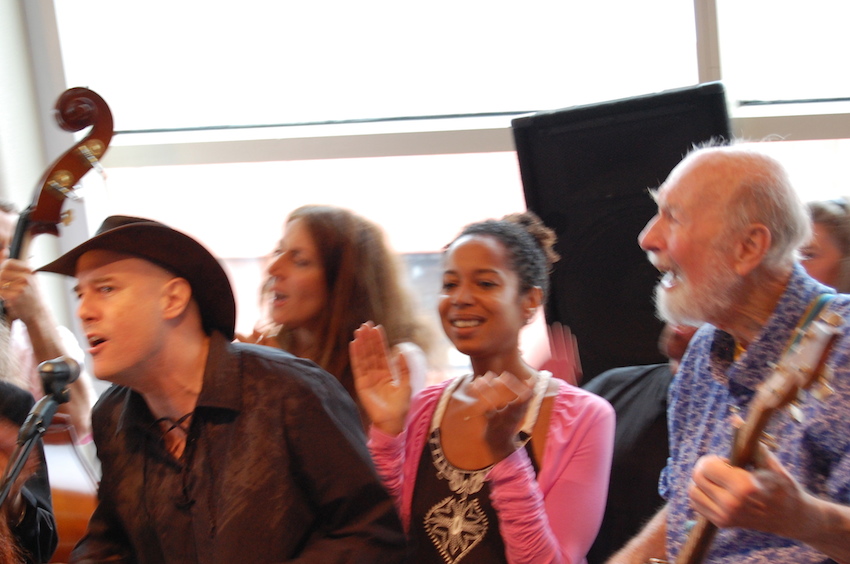 He also welcomed several of the musicians who were performing that day up on stage with him and took requests for songs. The band supported him on a kicking version of This Little Light of Mine, and Spook Handy helped keep things rolling along. Pete invited several of us to take a verse, which each of us made up on the spot. Singing a verse of This Little Light of Mine while standing on stage next to Pete and his banjo will remain one of the most memorable moments of my nearly 25 year career.
He also welcomed several of the musicians who were performing that day up on stage with him and took requests for songs. The band supported him on a kicking version of This Little Light of Mine, and Spook Handy helped keep things rolling along. Pete invited several of us to take a verse, which each of us made up on the spot. Singing a verse of This Little Light of Mine while standing on stage next to Pete and his banjo will remain one of the most memorable moments of my nearly 25 year career.
That’s lesson two from Pete: encourage others to offer their gifts. The world needs all of us to contribute. It’s not an individual competition, it’s a team sport. And we’re all on the same team. After the show, he hung around for a while and I got to spend a bit of time in conversation with him. He’s full of stories, as many who have met him will attest, and always happy to teach you a song if you’ve got the time.
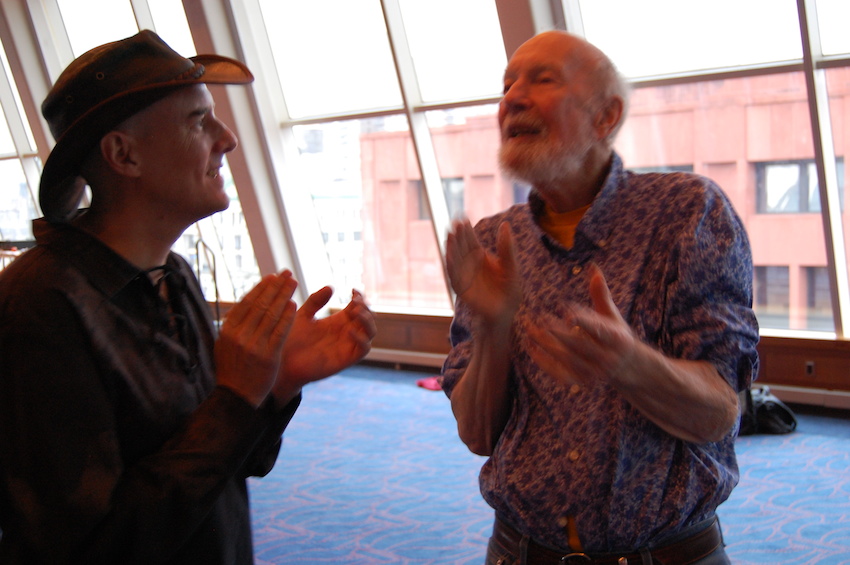 Less than two months ago we lost Nelson Mandela, another giant of the era, and it was interesting hearing the form that many remembrances took. My friend Martin spoke my mind when he noted that so many people were saying things like “We’ll never see his like again.” Taking nothing away from the greatness of either man, that’s a rather silly thing to say. It implies that some people are born with the ‘great’ gene, and the rest of us are destined to be normal. The truth is just the opposite. They earned our respect over decades of courageous decisions—the kinds of decisions that most of us are free to make. Courage isn’t a trait, it’s a choice, and we can work out our courage muscles by making small efforts. Moving a few chairs.
Less than two months ago we lost Nelson Mandela, another giant of the era, and it was interesting hearing the form that many remembrances took. My friend Martin spoke my mind when he noted that so many people were saying things like “We’ll never see his like again.” Taking nothing away from the greatness of either man, that’s a rather silly thing to say. It implies that some people are born with the ‘great’ gene, and the rest of us are destined to be normal. The truth is just the opposite. They earned our respect over decades of courageous decisions—the kinds of decisions that most of us are free to make. Courage isn’t a trait, it’s a choice, and we can work out our courage muscles by making small efforts. Moving a few chairs.
The third deep impression I still have of that day was striking how available he made himself. There was an inherent and well-practiced generosity in his approach to his own time. It was extraordinary to see a person of his stature take the time to hang out as long as people wanted to talk with him. There’s a difference between telling someone they matter and showing them.
There is so much more to say about him, of course, and in the next few days, many people will offer their remembrances as we come to grips with our loss and celebrate this live so well-lived. Pete Seeger gave us a powerful example of how to live a life of integrity and intention, and the question for us now is whether we will simply applaud, or instead, we will try to emulate it, in our own small ways. It seems to me that now that he is gone, the rest of us have a bit more work to do.
Thank you, Pete, for showing us how it’s done.
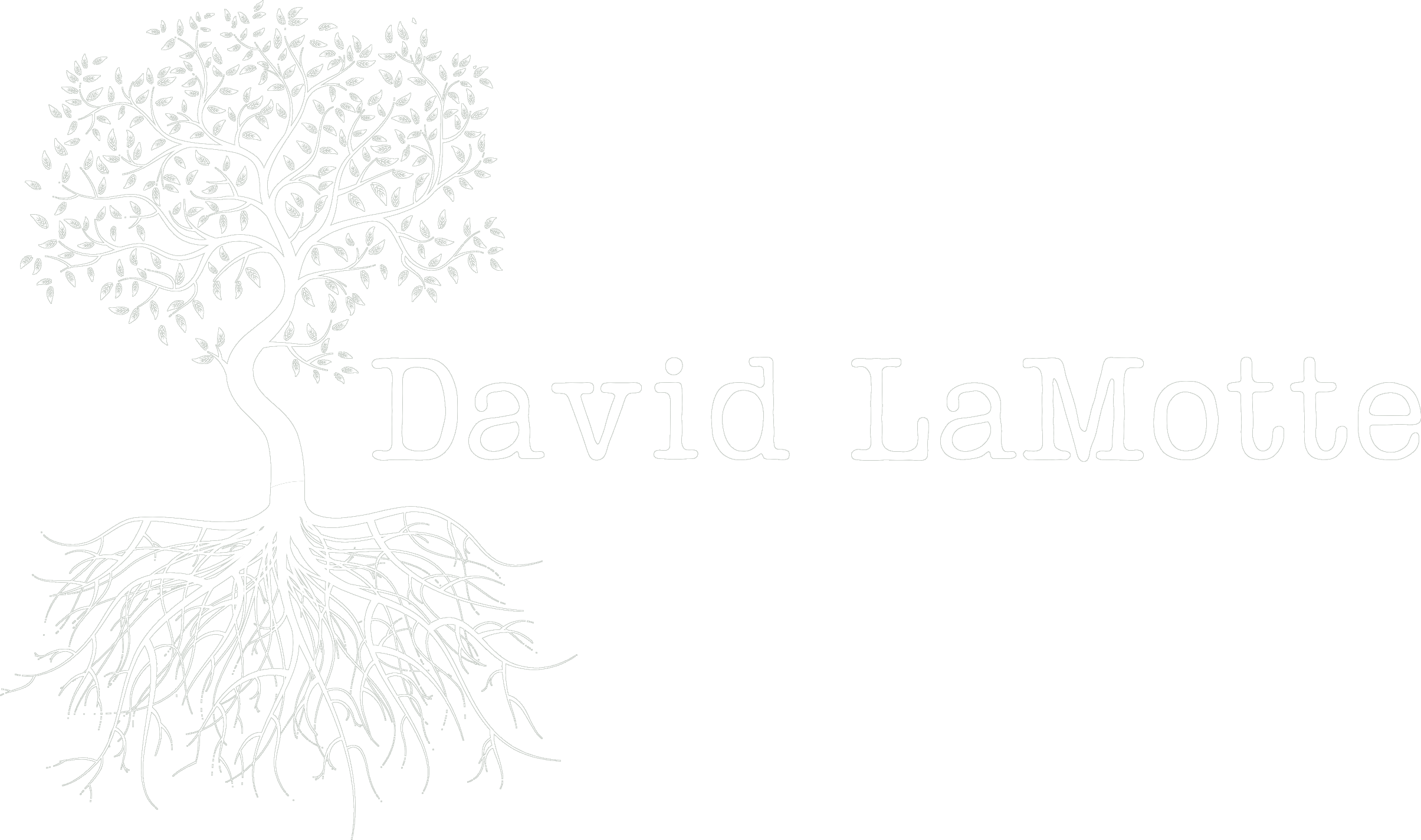
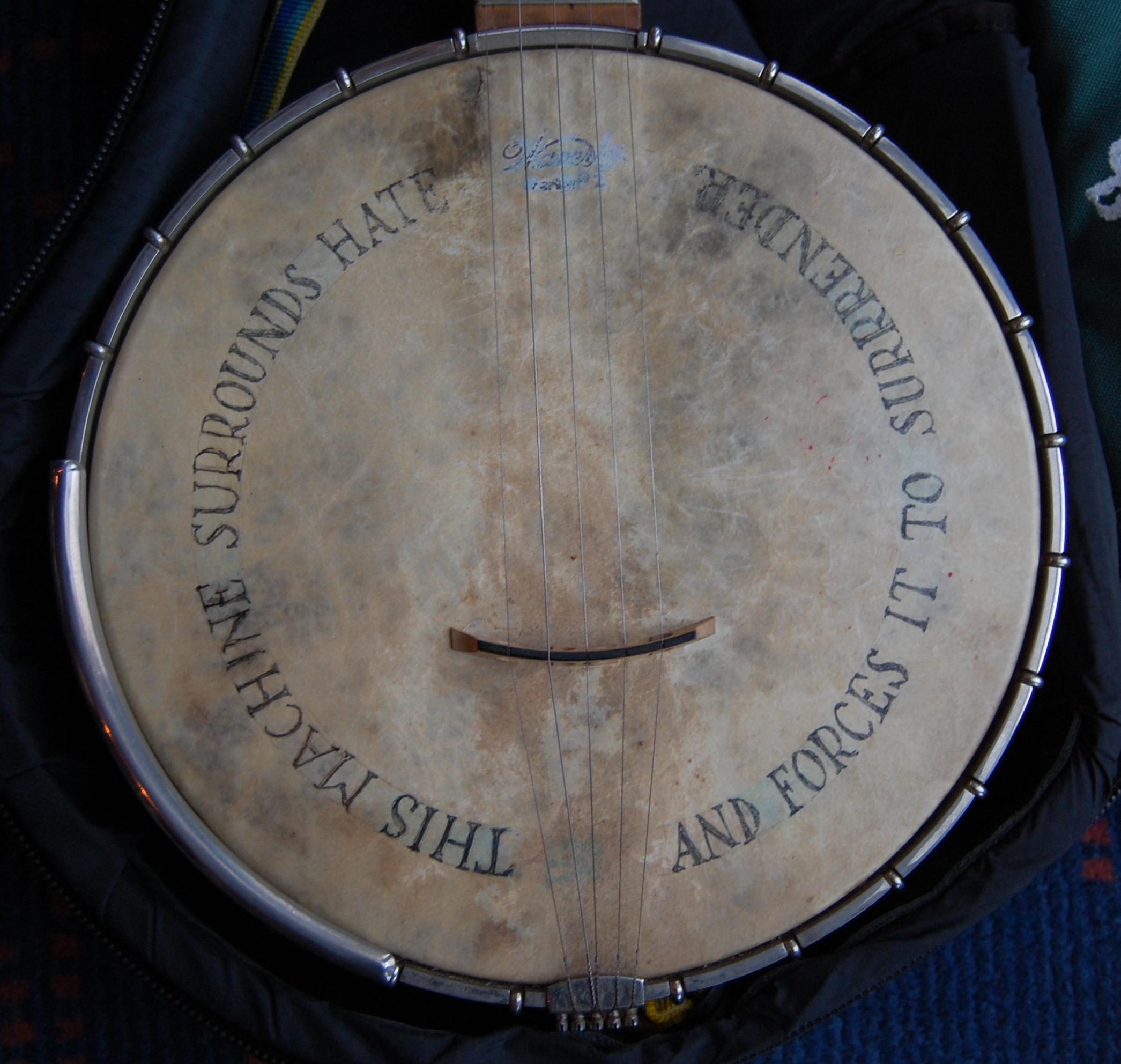


Hi David,
The story of rearranging the chairs doesn’t surprise me as I witnessed something similar with Pete many, many years ago. I was barely 20 years old and went to see him in concert at a hall in Monterey, right on the Monterey Plaza by the Ocean. We all filed into the full concert hall, Pete came out, did one song, then said: “There is a full moon out there and it is just too magical to be sitting inside. Let’s take this show outside.” The ushers and organizers looked at each other in unveiled panic but let Pete prevail.
We all filed out into a beautiful moonlit plaza and sat in a big circle on the ground around Pete. My girlfriend and I just happened to be in the center of the circle when it closed, right in front of Pete. After a full-length concert, Pete stood there and talked and signed things until the very last person had had a chance to chat with him. It took hours. I stayed to the very end, witnessing this most amazing person and his ability, and more importantly, his genuine INTEREST, in connecting with, and hearing, what everyone had to say. It made a big impression on me and I’ve gone back to that time in my mind many times.
Don’t know if I’m allowed to include an attachment, but thought I would share with you the results of your inspiration to my words for the peace focus at Pullen. (Feel free to moderate this out of your blog. Just wanted to share with you.) Several folks at Pullen came up to me afterwards to thank me for “reconnecting” them to you through your words. In gratitude ……….
FOCUS FOR PEACE SUNDAY
Pullen Memorial Baptist Church
February 2, 2014
Jonathan Sledge
“Peace is not the product of terror or fear. Peace is not the silence of cemeteries. Peace is not the silent result of violent repression. Peace is the generous, tranquil contribution of all to the good of all. Peace is dynamism. Peace is generosity. It is right and it is duty.” -Archbishop Oscar Romero
You know the feeling: that moment of realization that you are experiencing something extraordinary, a holy moment, sacred ground if you wish. Allow me to share one such moment I have experienced. It was my first trip to Nicaragua. My wife Deb, Pullen friend Charlotte Sweeney and I traveled to Nicaragua to explore how Pullen might enter into partnership with our newfound friends, medical missionaries David and Laura Parajón. When we arrived, we were taken to the First Baptist Church of Managua to meet with the pastor, Gustavo Parajón, David’s father, for some orientation.
Over the next two hours or more, the three of us sat in his small study listening to a quiet and humble man talk of doing the work of peace in his everyday life over the previous 40 years there in the country of his birth. As the stories unfolded, I knew at that moment that we were experiencing something extraordinary, a holy moment. Through Gustavo Parajón’s work as a public health physician, pastor, mediator and mentor, thousands of individuals were impacted directly, and an entire country indirectly. He brought together Sandinista and Contra, Catholic and Protestant, the powerful and the powerless, the well connected and the disenfranchised. It was his insistence that all would be served in communities that asked for his help. Nicaragua is a more peaceful country because of him. In his own words as a charge to us he said, “Be a faithful witness, be a bearer of hope, and focus on service.”
Some of you know that I have been privileged to serve on the board of the Baptist Peace Fellowship of North America, one of Pullen’s partner organizations, for the last 5½ years. An enduring value of that experience for me has been the privilege of regularly sitting around a table with some of the most extraordinary people I know who come from all across the continent trying to discern a pathway towards a Baptist witness for peace. Time and again, as I hear their passions, and experience their truths, my assumptions are challenged, my prejudices are exposed, my horizon broadened. Then each summer, when we gather for our annual conference affectionately known as Peace Camp, I again experience the sense of community among people who act out their faith all across North America, from Canada to Mexico, California to Puerto Rico, and indeed around the globe. Through this network, I find myself connected with people of faith from the far corners of our continent who share a commitment to the path that Pope Paul VI defined when he said: “If you want peace, work for justice.”
One last story: Troubadour, David LaMotte, whom some of you know since he sojourned among us here at Pullen for a time while working with the North Carolina Council of Churches, wrote the following tribute to Pete Seeger, whose life many of us have been celebrating this week:
“When [Pete] arrived [at the venue], the room was set with straight rows of portable chairs, with an aisle down the middle. And he took a look at the room, put his banjo down, and started moving chairs. He didn’t like the rigidity of the straight lines. Pete has always been in the business of creating community, introducing people to each other and to their own capacity to get things done if they work together. He didn’t want straight rows of obedient listeners, he wanted people to see each other as well as him, to embrace and support each other and to sing together.
“He was 92 at the time. There were hundreds of chairs. There were volunteers present. And he was… well, Pete Seeger. This is the man who wrote Where Have All The Flowers Gone? He taught us to sing This Land Is Your Land. He introduced Martin Luther King, Jr. to the song We Shall Overcome. It would not have been surprising or rude if he had said “Could you move these chairs before the show?” or even “Could you help me move these chairs?” He didn’t do either one.
“He just started moving chairs. Naturally, people who were there looked at each other and said “Maybe we should help Pete.” Before long, everyone had pitched in and the room was reset. It was more welcoming and spoke more of community than it had before.
“Ever the organizer, Pete showed us how it is done: Do the work. Show people what it looks like, then welcome other people into the work when they show up. Gandhi didn’t say “Demand the change.” He said “Be the change.”” https://www.davidlamotte.com/2014/01/learned-pete-seeger/
Thanks, Gustavo; thanks to all my friends at the Peace Fellowship; thanks David and Pete; and thanks to each of you and your stories and witness to a way of peace.
I think I’ll go move some chairs.
thanks, David, beautifully said and great lessons to take from your visit with him. I’m going to share this with my children.
Best
Monroe
Wonderful, Monroe. Thank you. And thank you, too, for the great work you do in this tradition. We’re lucky to have you in Western NC.
David, What a great story! I’ve been asked to speak a short focus time for Peace Sunday at Pullen this coming Sunday, and may retell a portion of this story, if you don’t mind. Missing you, Deanna and Mason among us!
Peace
I’d be honored, Jonathan. Please give everyone there my love. We miss you too!
David, I read your tribute from a post made by my friend of many years, Mary Andrews in Tyler, Texas. Yes, Pete Seeger was an icon of courage and intention. I so admired his life and music. I will deeply miss his guiding light. I’ve been proud to watch you too all these years as your life choices have reflected your principles.
Connie, I love seeing how circles close. Amazing that you and Mary are friends — and not so amazing. 😉 Thanks for your kindness.
Thank you David for this lovely tribute to a wonderful man and for all you do to encourage peace and music in our world.
Thank you, Elva.
well said, and true to the mark. thank you, david, for your own capable manner of reflecting the truths that want to be seen and embraced, most particularly in our selves as much as in the folk who inspire. be hugged and stay in one peace.
What a great sign-off! I will try to do that. 😉
Great way to add accolades to a man we wil remember for a long time. It has ignited a feeling as a songwriter that if i believe I can make a difference that maybe. I can. Look me up on You Tube “the insurance song” David Devine the “live” one. I just felt moved to mail it the other day to the Obamas. God Speed Pete!
Best of luck with your music, David. Many of us were inspired, eh?
David,
Thank you for sharing these reflections. They ring true to me in deep truth and in Pete’s life and your life. Courage, generosity, invitation, truth. You belonged on that stage and this is only part of the waves that will continue to flow out from it.
Thank you, Jim. I don’t think I would want to try to earn my way onto that stage. Grateful for the grace of being there, though.
Thank you for this beautiful rendering of a moment in Pete’s life. His music lead us all toward more spacious places. Songs and books like yours help us to keep gently pushing the boundaries. Thank you.
Thanks LisaRose. It’s good to have your shoulder next to mine in that gentle pushing.
In 2001 Dave Carter and Tracy Grammer came from the Woody Guthrie Festival to play a concert at our house. Dave was excited and kept saying “Tom, I was just on stage rubbing elbows with Pete Seeger, I really was.” Two years after Dave passed Linda and I were at Woodyfest again and watcned a skinny old guy put trash into a can. He took out another bag then crossed the street to pick up trash from the other side. I asked myself “is Pete doing that just because this is Woody’s hometown?” “No, he did it because he’s Pete Seeger.” Pete walked the walk.
That sounds about right, Tom. What an inspiration. Thanks for that story, and for taking the time to read mine.
Very touching. Thank you. I was at my computer around midnight last night when the NY Times broke into my chatting and told me Pete Seeger was gone. I cried.
Many tears shed today, for sure, but what more could one ask of a life? So much to celebrate.
Thank you for sharing your experience David-what a wonderful reminder of the importance of community and the uniqueness of each of our souls.
Thanks for reading it, Tyrone, and for the flame you’re carrying.
Thank you David for sharing such lovely memories. May we all now keep working in Pete’s example to build a better world…one song a time.
Amen, Dawud. You’re certainly doing your part!
Thank you for this beautiful tribute to a beautiful human being.
Thank you, Marylyn. I’ve been so fortunate to have the opportunity to cross paths with so many amazing people, some known and some unknown. Your family is included in that list. I’m sort of a Forrest Gump character in that way, I suppose. This is one meeting that left quite an impression, though.
I have only seen you once David, it was at the “forward together” Sylva Rally last August. Happened to be seating near you and your family in the crowd. Then I heard you sing and play. Just know I sensed you also “move the chairs”. Thank you for all you are doing too.
What a kind thing to say, Myrtle. On my good days I hope it’s true. I’m glad to have Pete’s example, not exactly to live up to, but at least to stretch toward. Forward together…
A great read, though hard to read through tears. Thank you for sharing your wonderful heart.
Thank you as well, Frank. Peace.
What a beautiful tribute, David! How fortunate to have had that experience, and how wonderful for you to be able to share it with us. The story about the chairs says it all about the man.
Fortunate indeed. Thank you Barbara.